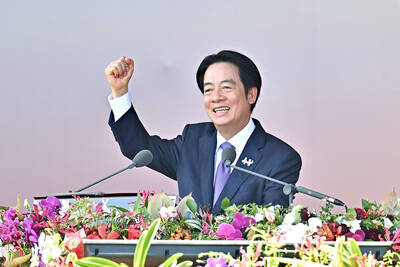More than 30,000 petitioners -- many of whom were brutally beaten and herded into a gymnasium -- have been detained in Beijing before a major meeting of the Chinese Communist Party, a human-rights group and witnesses said yesterday.
Some 36,000 people have been rounded up during the past week in an apparent move to ensure public order before the fourth plenary session of the party's elite 198-member Central Committee, New York-based Human Rights in China (HRIC) said.
Citing unnamed sources, it said police had been seen storming into petitioner settlements and breaking down makeshift structures, confiscating and destroying personal belongings.
"Many of them were brutally beaten or otherwise abused," the rights groups said. "Some of the abuses reported to HRIC include sustained beating and kicking of detainees, and prodding in the face with high-voltage electric batons."
Du Mingrong, 52, from Jilin Province, said that on Sept. 2, police vans surrounded a squatter area in southern Beijing where people stay as they try to lodge petitions against injustices with the government.
She said police arrested dozens of people, including an old man who was shoved to the ground and beaten for refusing to get into a police van.
"Those who refused to get into the vans were all beaten before being dragged into the vans," said Du, who claimed police had beaten her several times during the past months, including once with an electric baton.
Police had earlier stormed into the petitioners' makeshift homes, smashing windows, bowls and plates and scattering food on the floor, she said.
"They have no compassion at all, they are arresting people day and night," Du said.
Those not detained were too afraid to return to the village during daylight and only sneak back after dark to sleep.
Many petitioners, mostly detained without legal warrants, were taken to what HRIC described as a "concentration camp" in the basement of the Shijingshan Gymnasium in western Beijing. It was built for the Asian Games in 1992.
At the gymnasium on Tuesday, security guards were ordering onlookers away. Police vans and cars surrounded the building.
"Starting from Saturday or Sunday until today [Tuesday], bus after bus has been coming to the stadium, it is hard to say how many people they have brought in," one worker at the facility said.
After identifying the petitioners, police were handing them over to officials from the provinces where they came from, petitioners said.
Petitioners from all over China -- many of whom have suffered injustice at the hands of corrupt officials -- traditionally head to Beijing before major national events to try and make their voices heard.
Many were urging the release of Ye Guozhu (
"The right to petition is guaran-teed in China's Constitution, with no exceptions made for major events," HRIC president Liu Qing (劉青) said. "The central government should show its respect for the Constitution by taking whatever means are necessary to redress the injustice these people have suffered, rather than to add to their oppression."
Police could not immediately be reached for comment.

The Ministry of the Interior (MOI) is to tighten rules for candidates running for public office, requiring them to declare that they do not hold a Chinese household registration or passport, and that they possess no other foreign citizenship. The requirement was set out in a draft amendment to the Enforcement Rules of the Public Officials Election and Recall Act (公職人員選舉罷免法 ) released by the ministry on Thursday. Under the proposal, candidates would need to make the declaration when submitting their registration forms, which would be published in the official election bulletin. The move follows the removal of several elected officials who were

FOUR DESIGNATED AREAS: Notices were issued for live-fire exercises in waters south and northwest of Penghu, northeast of Keelung and west of Kaohsiung, they said The military is planning three major annual exercises across the army, navy and air force this month, with the navy’s “Hai Chiang” (海強, “Sea Strong”) drills running from today through Thursday, the Ministry of National Defense said yesterday. The Hai Chiang exercise, which is to take place in waters surrounding Taiwan, would feature P-3C Orion maritime patrol aircraft and S-70C anti-submarine helicopters, the ministry said, adding that the drills aim to bolster the nation’s offshore defensive capabilities. China has intensified military and psychological pressure against Taiwan, repeatedly sending warplanes and vessels into areas near the nation’s air defense identification zone and across

SENATE RECOMMENDATION: The National Defense Authorization Act encourages the US secretary of defense to invite Taiwan’s navy to participate in the exercises in Hawaii The US Senate on Thursday last week passed the National Defense Authorization Act (NDAA) for Fiscal Year 2026, which strongly encourages the US secretary of defense to invite Taiwan’s naval forces to participate in the Rim of the Pacific (RIMPAC) exercise, as well as allocating military aid of US$1 billion for Taiwan. The bill, which authorizes appropriations for the military activities of the US Department of Defense, military construction and other purposes, passed with 77 votes in support and 20 against. While the NDAA authorizes about US$925 billion of defense spending, the Central News Agency yesterday reported that an aide of US

NATIONAL DAY: The ‘Taiwan Dome’ would form the centerpiece of new efforts to bolster air defense and be modeled after Israel’s ‘Iron Dome,’ sources said President William Lai (賴清德) yesterday pledged to strengthen the nation’s air defense capabilities and build a “T-Dome” system to create a safety net against growing military threats from China. “We will accelerate our building of the T-Dome, establish a rigorous air defense system in Taiwan with multi-layered defense, high-level detection and effective interception, and weave a safety net for Taiwan to protect the lives and property of citizens,” he said in his National Day address. In his keynote address marking the Republic of China’s (ROC) 114th anniversary, Lai said the lessons of World War II have taught nations worldwide “to ensure that